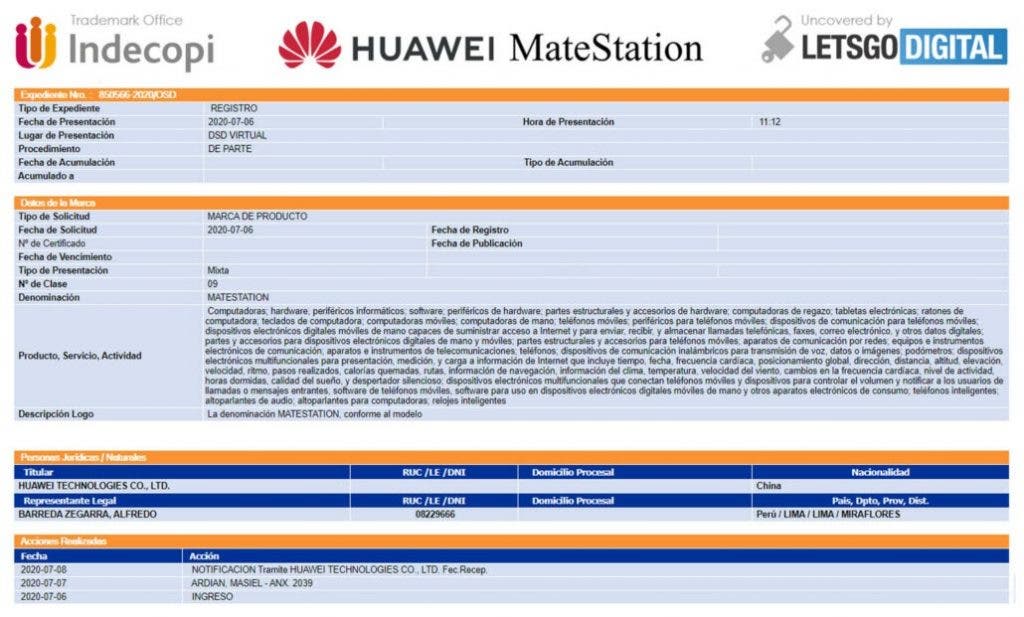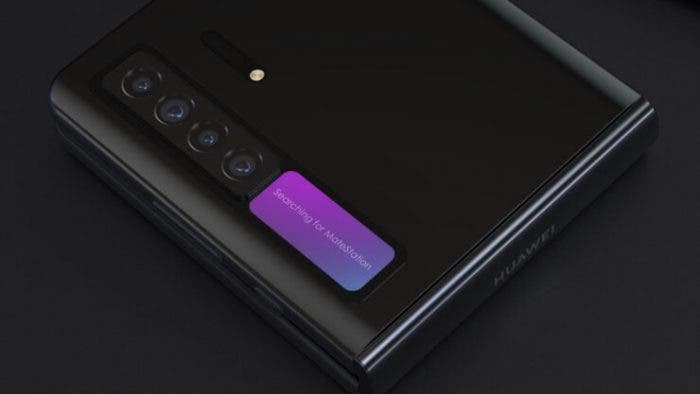In recent times, Chinese manufacturing giant, Huawei, has been registering a plethora of trademarks. We have seen the “Mate V” and “Ark Compiler” trademarks. Now, there are reports that Huawei submitted a new trademark called MateStation to INDECOPI on July 6, 2020, in Peru. According to speculations, the trademark may be a smartphone dock accessory, similar to Samsung’s DeX.

Huawei’s description of the MateStation trademark
Huawei describes the accessory as follows, “Mobile phone accessory, handheld mobile digital electronic device capable of providing Internet access and for sending, receiving and storing telephone, facsimile, e-mail, and other digital data; for voice, data or image transmissions. Wireless communication device. Multifunctional electronic devices used to present, measure, and upload information to the Internet, including time, date, heart rate, global positioning, direction, distance, altitude, speed, pace, steps taken, calories burned, route, navigation information, weather. Information such as temperature, wind speed, heart rate changes, activity level, sleep time, sleep quality, and silent alarm; connected phones and devices. A multifunctional electronic device for controlling volume and notifying users of incoming calls or messages; a computer.”
Judging from the application time of this trademark, Huawei MateStation should be an accessory for the Mate 40 series or even Mate V. Recall that the Huawei Mate 20 series comes with EMUI computer mode. With this feature, users are able to connect a mouse, keyboard, and other peripherals. Furthermore, users can make data transfer through U disk or other media.
Furthermore, there are reports that the Huawei Mate 40 series will use the 5nm Kirin 1000 or 1020 processor. This chip reportedly improves the performance by 50% relative to the Kirin 990 SoC. If this smartphone will be compatible with the Huawei MateStation, then it should provide users with a smooth desktop experience. Of course, it remains to be seen whether Huawei MateStation will come with the Mate 40 series.
HUAWEI MATE 40 SERIES SPECULATIONS
Recent speculations show that the Huawei Mate 40 series will come with a 90Hz display. Although there are two samples (90Hz and 120Hz), Huawei cares so much about its batteries thus it will most likely go for a 90Hz display. Its 5nm processor will be delivered before mid-September. According to @MobileWaferDarren, Huawei is going to need a lot of chips before the end of the year. The company will need 5nm, 7nm, 16nm, and 28nm mobile chips. It will also need a TWS headset Bluetooth chip developed by HiSilicon. All these chips in their numbers will be available before mid-September.
From previous reports, the Mate 40 series will use a 5nm Kirin processor. Also, this chip combines either the Cortex A77 or A78 CPU architecture + Mali G77/G78 GPU architecture. Such a combination will guarantee a better performance for the 120Hz high refresh rate screen experience.
As for the exact name of the next Kirin 5nm chip, there has been some confusion. While there was a report that claims that it will be Kirin 1000, others say it will be Kirin 1020. Either way, there are reports that the development code of Kirin 1000 is “Baltimore”. Recall that the Kirin 990 5G uses Cortex A76 architecture. This sparks speculations that the Kirin 1000 may use Cortex A77/A78 architecture and Mali G77/G78 GPU architecture. With this combination, the performance of the CPU and GPU will increase dramatically. In all, we will have to wait a few months to get the exact architecture of this chip.
Follow Gizchina.com on Google News for news and updates in the technology sector.





